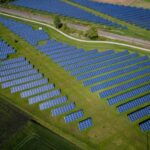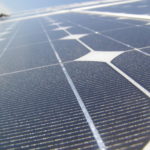Wind and solar account for 90% of new utility-scale energy additions to U.S. grid in first half of 2021
Data from both FERC and the U.S. EIA confirm that nearly all new U.S. electrical generating capacity additions in the first six months of 2021 were from renewable energy sources, this according to analysis from the SUN DAY Campaign.
FERC’s latest monthly “Energy Infrastructure Update” report (with data through June 30, 2021) reveals that renewable energy sources accounted for 91.6% (10,940 MW) of the 11,940 MW of new capacity added during the first six months of the year. Wind led the capacity additions with 5,617 MW, followed closely by solar (5,279 MW). Further, wind and solar were the only sources of new capacity additions in June 2021.
Renewables now provide more than one quarter (25.1%) of total U.S. available installed generating capacity. A year ago, their combined share was only 23.0%. Wind is now 10.4% of the nation’s generating capacity while utility-scale solar is 4.9% … and that does not include residential and commercial solar additions.
Moreover, FERC data suggest that renewables’ share of generating capacity is on track to increase significantly over the next three years. “High probability” generation capacity additions for wind, minus anticipated retirements, reflect a projected net increase of 21,129 MW while solar is foreseen growing by 44,385 MW. By comparison, net growth for natural gas will be only 13,241 MW. Thus, wind and solar combined are forecast to provide roughly five-times more new net generating capacity than natural gas through June 2024. Renewable energy generating capacity should then account for 29.4% of the nation’s total available installed generating capacity.
The latest issue of EIA’s “Electric Power Monthly” (with data through June 30, 2021) also reveals that solar and wind both continued their rapid growth. For the first six months of 2021, solar-generated electricity — including residential solar — expanded by 25.3% (compared to the same period in 2020) and provided nearly 4.1% of the nation’s total. Wind grew by 10% and accounted for more than 9.6% of total generation.
Combined, net electrical generation by wind and solar is 14.1% greater than one year ago and provided a bit more than 13.7% of total U.S. electrical production during the first six months of 2021. Together with generation by hydropower, biomass and geothermal, overall production by renewables grew by 3% and provided 22.4% of total U.S. electrical output.
Moreover, renewables produced 2.2% more electricity than coal through June 2021 and expanded their lead over nuclear power. In fact, during the first half of this year, renewables outperformed nuclear power by 16.4%.
“FERC’s and EIA’s mid-year data confirm that renewables have now moved into second place, behind only natural gas, in terms of both generating capacity and actual electrical generation,” noted Ken Bossong, Executive Director of the SUN DAY Campaign. “And their continued, strong growth — especially by solar and wind — suggest that the best is yet to come.”
News item from SUN DAY
<!–
–>
Original Source: https://www.solarpowerworldonline.com/2021/08/wind-and-solar-account-for-90-of-new-utility-scale-energy-additions-to-u-s-grid-in-first-half-of-2021/













